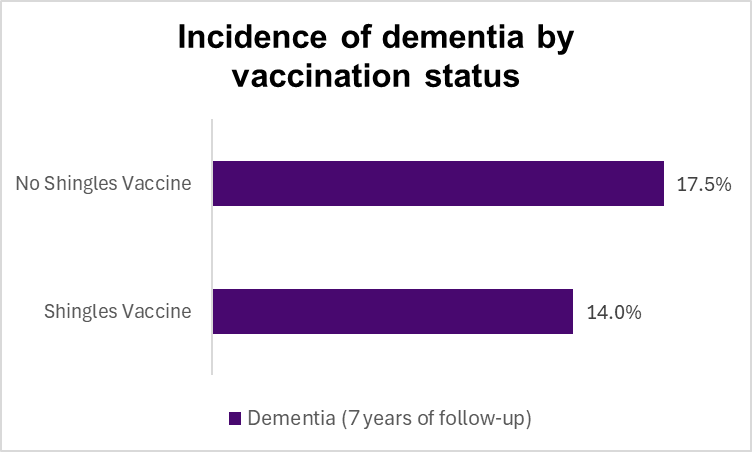Shingles vaccine associated with decrease in dementia
April 14, 2025
Source: Eyeting, et al Nature. April 2, 2025
Shingles is a reactivation of the chickenpox virus, which persists in nerves after recovery from the childhood viral infection. Shingles is associated with severe nerve pain, usually localized to a single nerve region. Many describe the pain of shingles as “the worst in my life.” Some who have shingles will get post-herpetic neuralgia, where their pain will persist even after the acute shingles episode is over. Shingles on the face can cause visual loss and shingles can in rare cases lead to encephalitis (brain swelling) that can be fatal.
The country of Wales created a natural experiment in 2013when they offered shingles vaccines for one year to adults who were born after September 2, 1933., This allowed researchers to compare outcomes in those who were born just before and just after the cutoff date. They compared those born just before the cutoff who were not eligible for the vaccine with those born just after the cutoff, about half (48%) of whom received the vaccination, using the United Kingdom’s universal electronic medical record system for follow up.
They reported in Nature last week that those who received the live shingles vaccine (Zostavax) were 20% less likely to develop dementia over a period of 7 years. That vaccine has been discontinued in the U.S. since a newer recombinant vaccine (Shingrix) is more effective. A study published last year demonstrated that Shingrix is associated with a decrease in dementia beyond the benefit of Zostavax.
The chickenpox vaccine became available in 1995, so those born more recently who were vaccinated will be at much lower risk for shingles.
Scientists believe that preventing these viral reactivation infections lowers dementia risk by preventing infection that leads to low-level brain inflammation, and that stimulation of the immune system could also provide some protection.
Implications for employers:
Adults at or over age 50 are recommended to receive two Shingrix shots, and this should be covered with no cost sharing.
Preventing cases of shingles provides additional value to employers by decreasing time away from work.
August is National Immunization Awareness Month and a good time to remind employees and their dependents about the vaccines available for no cost share.
Thanks for reading. You can find previous posts in the Employer Coverage archive
Please subscribe, “like” share this newsletter with friends and colleagues. Thanks!
Tomorrow: Heart disease risks are higher in rural communities

